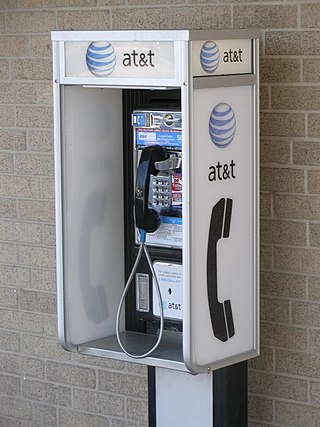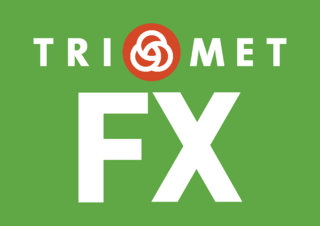
A payphone is typically a coin-operated public telephone, often located in a telephone booth or in high-traffic public areas. Prepayment is required by inserting coins or telephone tokens, swiping a credit or debit card, or using a telephone card.

The Tri-County Metropolitan Transportation District of Oregon (TriMet) is a transit agency that serves most of the Oregon part of the Portland metropolitan area. Created in 1969 by the Oregon legislature, the district replaced five private bus companies that operated in the three counties: Multnomah, Washington, and Clackamas. TriMet began operating a light rail system, MAX, in 1986, which has since been expanded to five lines that now cover 59.7 miles (96.1 km). It also operates the WES Commuter Rail line since 2009. It also provides the operators and maintenance personnel for the city of Portland-owned Portland Streetcar system. In 2023, the system had a ridership of 62,055,600, or about 196,000 per weekday as of the first quarter of 2024.

Bell Canada is a Canadian telecommunications company headquartered at 1 Carrefour Alexander-Graham-Bell in the borough of Verdun, Quebec, in Canada. It is an ILEC in the provinces of Ontario and Quebec; as such, it was a founding member of the Stentor Alliance. It is also a CLEC for enterprise customers in the western provinces.
A voicemail system is a computer-based system that allows people to leave a recorded message when the recipient is unable to answer the phone. The caller is prompted to leave a message and the recipient can retrieve said message at a later time.

A telephone booth, telephone kiosk, telephone call box, telephone box or public call box is a tiny structure furnished with a payphone and designed for a telephone user's convenience; usually the user steps into the booth and closes the booth door while using the payphone inside.
A ringback number is a telephone number for a telephone line that automatically calls the line that the call was placed from, after the caller has hung up. The typical use of this facility is by telephone company technicians for testing a new installation or for trouble-shooting.
Phone fraud, or more generally communications fraud, is the use of telecommunications products or services with the intention of illegally acquiring money from, or failing to pay, a telecommunication company or its customers.
Gizmo5 was a voice over IP communications network and a proprietary freeware soft phone for that network. On November 12, 2009, Google announced that it had acquired Gizmo5. On March 4, 2011, Google announced that the service would be discontinued as of April 3, 2011.

Free Geek is a technology related non-profit organization based in Portland, Oregon, launched on April 22, 2000. It started as a public event at Pioneer Courthouse Square. In September 2000, it opened a permanent facility as a drop off site for electronic waste. In January 2001, local newspaper The Oregonian ran an article advertising their free computer program for volunteers, which became so successful that they had to start a waiting list. They currently have over 2,000 active volunteers per year.

Telephone numbers in Singapore, also known as the National Numbering Plan, are regulated by the Info-communications Media Development Authority (IMDA). Due to the small geographical size of Singapore, there are no area or trunk codes; all numbers belong to one numbering area, and thus come in the same 8-digit format. Numbers are categorised based on the first digit, thus providing ten possible categories, of which six are currently in use and the remaining four reserved for future usage.

Cascade Policy Institute is a non-profit and non-partisan American libertarian think tank based in Oregon that focuses on state and local issues. Founded in 1991, the institute advocates limited government in cost and size, and promotes privatization and other free market alternatives to government services. Cascade is a member of the State Policy Network, a network of conservative and libertarian think tanks in the United States and Canada.
1-5-7-1 is the name of a family of calling features in the United Kingdom, for residential and business telephone lines and for mobile telephones, that are provided by BT Group and several other telephone service providers. The family is named after the telephone number 1571, the special service number that is used to access it. Call Minder is the name of BT's highest level of 1571 service.

Google Voice is a telephone service that provides a U.S. phone number to Google Account customers in the U.S. and Google Workspace customers in Canada, Denmark, France, the Netherlands, Portugal, Spain, Sweden, Switzerland, the United Kingdom and the contiguous United States. It is used for call forwarding and voicemail services, voice and text messaging, as well as U.S. and international calls. Calls are forwarded to the phone number that each user must configure in the account web portal. Users can answer and receive calls on any of the phones configured to ring in the web portal. While answering a call, the user can switch between the configured phones. Subscribers in the United States can make outgoing calls to domestic and international destinations. The service is configured and maintained by users in a web-based application, similar in style to Google's email service Gmail, or Android and iOS applications on smartphones or tablets.
Northern Telecom manufactured several different payphone models. They were most commonly used in Canada and the United States. Nortel has manufactured several types in Canada.

Telephone Newspapers, introduced in the 1890s, transmitted news and entertainment to subscribers over telephone lines. They were the first example of electronic broadcasting, although only a few were established, most commonly in European cities. These systems predated the development, in the 1920s, of radio broadcasting. They were eventually supplanted by radio stations, because radio signals could more easily cover much wider areas with higher quality audio, without incurring the costs of a telephone line infrastructure.
Village Telco is an initiative to build low-cost community telephone network hardware and software. It is based on a suite of open-source applications that enable entrepreneurs to set up and operate a telephone service in a specific area or supporting the needs of a specific community.

Lew Frederick is an American Democratic politician, currently representing District 22 in the Oregon Senate.

LinkNYC is an infrastructure project providing free Wi-Fi service in New York City. The office of New York City Mayor Bill de Blasio announced the plan on November 17, 2014, and the installation of the first kiosks, or "Links," started in late 2015. The Links replace the city's network of 9,000 to 13,000 payphones, a contract for which expired in October 2014. The LinkNYC kiosks were devised after the government of New York City held several competitions to replace the payphone system. The most recent competition, in 2014, resulted in the contract being awarded to the CityBridge consortium, which comprises Qualcomm; Titan and Control Group, which now make up Intersection; and Comark.

The KX series of telephone boxes in the United Kingdom was introduced by BT in 1985. Following the privatisation of BT in 1984, the company decided to create a newly designed and improved take on the British telephone box, which at this point consisted of only red telephone boxes which BT had recently acquired, the most common being the iconic K6 box. These red boxes were considered flawed in parts by BT for several reasons, including cost, lack of ventilation, accessibility and maintenance. BT announced the £160 million series of new boxes, the KX series designed by GKN, as well as announcing the eventual replacement of all existing telephone boxes. The main telephone box in the KX range is the KX100. Upon launch, there were five models in total. The boxes were produced at a rate of 5,000 a year, with the total count of all BT-owned kiosks reaching 137,000 by 1999, a number which has since decreased by more than seventy per cent.

Frequent Express (FX) is a high-capacity bus service with some bus rapid transit (BRT) features in Portland, Oregon, United States. Operated by TriMet as FX2–Division, the 15-mile (24 km) route runs east–west from 5th & Hoyt on the Portland Transit Mall in downtown Portland to Cleveland Avenue Park and Ride in Gresham via Division Street. It connects Portland City Center, Portland State University (PSU), South Waterfront, Southeast Portland, and central Gresham, with transfers to MAX Light Rail and the Portland Streetcar.












